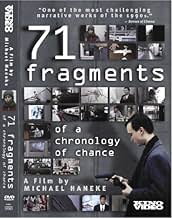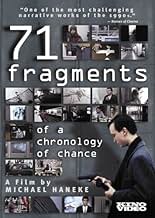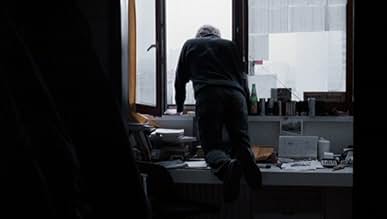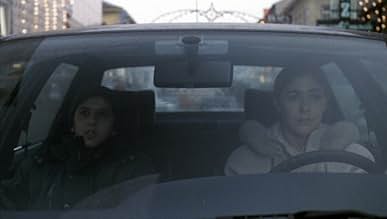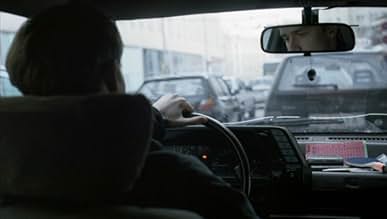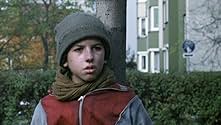IMDb रेटिंग
7.1/10
9.3 हज़ार
आपकी रेटिंग
अपनी भाषा में प्लॉट जोड़ें71 scenes revolving around a recent immigrant, a couple that has just adopted a daughter, a college student and a lonely old man.71 scenes revolving around a recent immigrant, a couple that has just adopted a daughter, a college student and a lonely old man.71 scenes revolving around a recent immigrant, a couple that has just adopted a daughter, a college student and a lonely old man.
- पुरस्कार
- 4 जीत और कुल 1 नामांकन
Michael Jackson
- Self
- (आर्काइव फ़ूटेज)
- (बिना क्रेडिट के)
फ़ीचर्ड समीक्षाएं
This film is the last in Michael Haneke's trilogy about alienation called "Vergletscherung die Gefühle", and it ends in a violent climax which is a result of the previous fragments that Haneke presents to us. In this film Haneke developed a style that is very reminiscient of his 2000 film "Code Inconnu". It features rather short episodes, and within each episode there is scarcely editing or camera movement. Each episode is divided by a second's black screen, and Haneke often interrupts and ends the episode in the middle of a person's sentence. This is a very economical style of filmmaking, and it certainly demands a lot of the viewers, because you only get the information you really need to connect this episode thematically to the others. Because this is a thematic film, and it is a brilliant, stylish, ice-cold half-misanthropic study of people's lack of ability to perform tender acts with each other. I have never seen people make love in a film by Haneke, except for the masochistic and sad attempts in "La Pianiste". Rather, Haneke shows his characters in situations where they are tired, fed up, irritated or full of hate; quite ordinary human emotions. You cannot blame Haneke for not being a positive director, for he is the only filmmaker working today who can portray and observe his characters so coldly and so unpassionately. And his project seems to be to expose our lack of love and passion for each other, but most of all our lack of ability to tell it as it is. Speak to each other and solve everything, seems to be Haneke's advice, without him really giving it. I never seem to like Haneke's characters, and that is a good thing really. Like fellow German-speaking directors Herzog and Fassbinder, Haneke seems a bit misanthropic in his characteristics. Too many directors try too hard to give characters sympathetic traits, and you just lose interest in the story. "71 Fragmente einer Chronologie des Zufalls" is quite an achievement in filmmaking, and it is a film that will stick with me forever. I will never forget because I never knew why (the incident at the end). That is how I will remember this film, and how many times in real life is "why" the only question never answered?
I must say that I really enjoyed this movie. The subtle exploration of the character in very personal en realistic scenes were executed in the perfect cinematic way (framing, staging, blocking, pacing, editing). The way Haneke used (the lack
of) cohesive plot really caught my attention and made me excited about how the story was going to unfold. Though the end was a bit unsatisfying for me. I wasn't drawn enough to the characters to experience a emotional climax through any strong perspective from a character arc. I understanded the thematic exploration but found the climax a bit underwhelming. I'll defintely rewatch to get a hold of more missed details which might immerse me more than my first viewing.
Mr. Michael Haneke begs the audience to start asking the important questions.
The film begins with a text of a news item involving a bank shooting incident in Vienna a day before Christmas eve 1993 that left three people dead with the 19-year-old assailant later found to have shot himself nearby.
What then follows is a series news broadcasts interspersed with scenes involving seemingly random characters while they go through their day-to-day existence: a Romanian refugee who illegally entered Austria seeking asylum, a soldier, an armored van security guard, a college student, a couple having trying to adopt a kid, and elderly man and his bank employee daughter.
The film is, as the title indicates (and I'll take the filmmaker's word on that), there are a total of "71 fragments" divided into segments that are separated by almost three seconds of black frames. I actually took trouble counting those (because I don't have a life) and found out that--
The different characters are shown going through mundane activities throughout the film and it gives the viewers an insight to human behaviour and the dynamic between the characters whose connection to the other charcters are more evident than some. They are also seen to be watching these same news broadcasts in their respective environments apart from the segments that solely featured these news items being played on-screen, which in a way connects almost every person in this film.
Mr. Haneke has a style all to his own. He's a master in evoking fright without necessarily having to show much, this will be apparent near the end of the film, the Haneke genius I'd say, just as gruesome. This is not one of his best work but it stands out on its own for the always-relevant commentary that he wishes to expound.
The narrative that Mr. Haneke wanted to express could only be realized through a closer scrutiny of the various fragments which eventually points to a far greater tragedy, and he also throws in a fair warning as well. The same thing could also can be said regarding the conflicts around the world. We see the news on TV, the horrific images, the drama, yet something is lacking. What were the events that led up to the tragic outcome that we all get to witness on the screen? Clearly, there are some people who know more than others and the news reporters seem not to be able to get to those people for some reason or another, it is this incompleteness that kind of detaches us, the viewers, from the horror, and there are people taking advantage of other people's silence and rendering them just as complicit to those acts of violence.
My rating: A-minus.
The film begins with a text of a news item involving a bank shooting incident in Vienna a day before Christmas eve 1993 that left three people dead with the 19-year-old assailant later found to have shot himself nearby.
What then follows is a series news broadcasts interspersed with scenes involving seemingly random characters while they go through their day-to-day existence: a Romanian refugee who illegally entered Austria seeking asylum, a soldier, an armored van security guard, a college student, a couple having trying to adopt a kid, and elderly man and his bank employee daughter.
The film is, as the title indicates (and I'll take the filmmaker's word on that), there are a total of "71 fragments" divided into segments that are separated by almost three seconds of black frames. I actually took trouble counting those (because I don't have a life) and found out that--
The different characters are shown going through mundane activities throughout the film and it gives the viewers an insight to human behaviour and the dynamic between the characters whose connection to the other charcters are more evident than some. They are also seen to be watching these same news broadcasts in their respective environments apart from the segments that solely featured these news items being played on-screen, which in a way connects almost every person in this film.
Mr. Haneke has a style all to his own. He's a master in evoking fright without necessarily having to show much, this will be apparent near the end of the film, the Haneke genius I'd say, just as gruesome. This is not one of his best work but it stands out on its own for the always-relevant commentary that he wishes to expound.
The narrative that Mr. Haneke wanted to express could only be realized through a closer scrutiny of the various fragments which eventually points to a far greater tragedy, and he also throws in a fair warning as well. The same thing could also can be said regarding the conflicts around the world. We see the news on TV, the horrific images, the drama, yet something is lacking. What were the events that led up to the tragic outcome that we all get to witness on the screen? Clearly, there are some people who know more than others and the news reporters seem not to be able to get to those people for some reason or another, it is this incompleteness that kind of detaches us, the viewers, from the horror, and there are people taking advantage of other people's silence and rendering them just as complicit to those acts of violence.
My rating: A-minus.
Before Austrian film director Michael Haneke got well-recognized and appreciated in the international film circuit with such films as "Code Unknown", "Time of the Wolf" and "The Piano Teacher" (all of which were made in France and shown in Cannes), he already made his mark with a number of films made in his native Austria, one of which is this film called "71 Fragments of a Chronology of Chance"(1994). This work is the third installment in the director's "glaciation trilogy" (the other two being "The Seventh Continent" and "Benny's Video"), thus called because of the central theme of the fine line between barbarism and civility in modern urban life being completely, hopelessly blurred. The "barrier" has been broken, so to speak.
As the title suggests, the film consists of 71 "fragments" or vignettes, seemingly random, unrelated and mundane, of various characters going through the motions and vagaries of daily existence in urban Austria. But one can sense that this only seems to be so, as the film's prologue suggests that this is the event that will loom over the succeeding "fragments". And that is, the 1993 Christmas Eve reckless shooting done by a 19-year-old student named only as Maximillian B. inside a bank and on the streets, before eventually shooting himselfone that is purportedly based on a real-life incident.
No explanations or back-stories are provided to the characters and their situations being shown "episodically" on the screen (a Romanian boy refugee, a bank delivery man, an old pensioner, a childless couple and, of course, the student himself). More often than not, a specific fragment is abruptly interrupted or ended by a black fade-out (an alienating technique Haneke once again utilized in the equally visceral and demanding "Code Unknown"). Some fragments happen for not more than a minute, while some last for as long as five or even eight minutes (notably the scene where the student practices ping-pong tennis facing an automated opponent and the scene where the old pensioner argues with his daughter over the phone, both of which vividly displaying a whole gamut of simmering emotions without ever resorting to histrionics). Even reinforcing the clinical, cold approachfor which Haneke is really knownis the utter lack of an accompanying soundtrack and the wordlessness of some scenes.
The sense of dread is punctuated by the ever-present television (as is the case in the two other films in the trilogy), from where a specific world news is being broadcast (like the ethnic war in Somalia and the child abuse charges against pop star Michael Jackson). This is as if to suggest that the looming event foreboded at the film's start is itself to become a subject of a TV news coverage which, albeit small in scale when compared to the news indicated above, is nevertheless not without a lasting cost to the human lives involved, physically, emotionally and psychologically. Having said this, how has the line separating civility and barbarism come to be completely violated in this thought-provoking film?
The trigger shooting perpetrated by the young student, which serves to be the film's denouement, appears to have been done for no apparent reason at all. It's senseless killing in its purest meaning (which arguably is the underlying essence of the middle-class family's suicide in "The Seventh Continent" and the teenage boy's videotaped murder of the girl in "Benny's Video"). And this is what makes the act all the more chilling. It's as if to suggest that such a self-destructive act is inherent in everyone of us, if not what makes up our essence, waiting only to be brought to the surface by a seemingly random and inconsequential spate of events (in "71 Fragments'" case, it's to be rooted in the student's lack of enough cash to pay for his car gas).
And when the "event" does finally happen, rather than to serve as an important food-for-thought, it's sadly reduced to no more than a piece of media sensation, regarded as the hot "news of the day", focusing more on "what" happened than on "why" did it happen. The alarming incident thus becomes another piece of media entertainment, to be savored by mass consumers who always crave for what is sensational and controversial, without ever thinking of its deep-rooted incitations and implications. (This is a thought which Haneke is to delve full-blown in "Funny Games", both the Austrian and American versions, though I really prefer the first one.)
If in Polish auteur Krzysztof Kieslowski's world, chance incidents and fateful encounters are all part of a grand design to convey deep layers of human emotional truths (like in the truly majestic "Three Colors" trilogy), in Haneke's (or at least in the world of "71 Fragments"), such randomness is to be put in order by an inherent barbarism that's only barely creeping out of the human psyche.
As the title suggests, the film consists of 71 "fragments" or vignettes, seemingly random, unrelated and mundane, of various characters going through the motions and vagaries of daily existence in urban Austria. But one can sense that this only seems to be so, as the film's prologue suggests that this is the event that will loom over the succeeding "fragments". And that is, the 1993 Christmas Eve reckless shooting done by a 19-year-old student named only as Maximillian B. inside a bank and on the streets, before eventually shooting himselfone that is purportedly based on a real-life incident.
No explanations or back-stories are provided to the characters and their situations being shown "episodically" on the screen (a Romanian boy refugee, a bank delivery man, an old pensioner, a childless couple and, of course, the student himself). More often than not, a specific fragment is abruptly interrupted or ended by a black fade-out (an alienating technique Haneke once again utilized in the equally visceral and demanding "Code Unknown"). Some fragments happen for not more than a minute, while some last for as long as five or even eight minutes (notably the scene where the student practices ping-pong tennis facing an automated opponent and the scene where the old pensioner argues with his daughter over the phone, both of which vividly displaying a whole gamut of simmering emotions without ever resorting to histrionics). Even reinforcing the clinical, cold approachfor which Haneke is really knownis the utter lack of an accompanying soundtrack and the wordlessness of some scenes.
The sense of dread is punctuated by the ever-present television (as is the case in the two other films in the trilogy), from where a specific world news is being broadcast (like the ethnic war in Somalia and the child abuse charges against pop star Michael Jackson). This is as if to suggest that the looming event foreboded at the film's start is itself to become a subject of a TV news coverage which, albeit small in scale when compared to the news indicated above, is nevertheless not without a lasting cost to the human lives involved, physically, emotionally and psychologically. Having said this, how has the line separating civility and barbarism come to be completely violated in this thought-provoking film?
The trigger shooting perpetrated by the young student, which serves to be the film's denouement, appears to have been done for no apparent reason at all. It's senseless killing in its purest meaning (which arguably is the underlying essence of the middle-class family's suicide in "The Seventh Continent" and the teenage boy's videotaped murder of the girl in "Benny's Video"). And this is what makes the act all the more chilling. It's as if to suggest that such a self-destructive act is inherent in everyone of us, if not what makes up our essence, waiting only to be brought to the surface by a seemingly random and inconsequential spate of events (in "71 Fragments'" case, it's to be rooted in the student's lack of enough cash to pay for his car gas).
And when the "event" does finally happen, rather than to serve as an important food-for-thought, it's sadly reduced to no more than a piece of media sensation, regarded as the hot "news of the day", focusing more on "what" happened than on "why" did it happen. The alarming incident thus becomes another piece of media entertainment, to be savored by mass consumers who always crave for what is sensational and controversial, without ever thinking of its deep-rooted incitations and implications. (This is a thought which Haneke is to delve full-blown in "Funny Games", both the Austrian and American versions, though I really prefer the first one.)
If in Polish auteur Krzysztof Kieslowski's world, chance incidents and fateful encounters are all part of a grand design to convey deep layers of human emotional truths (like in the truly majestic "Three Colors" trilogy), in Haneke's (or at least in the world of "71 Fragments"), such randomness is to be put in order by an inherent barbarism that's only barely creeping out of the human psyche.
An excellent movie that took my breath away. Haneke forces us to view television like we view film. He has no answers but throws us many questions. One of many things this movie shows us is how we stop to listen to the violence the news presents for us every day. We has almost come to the point that we need the films storytelling to get involved, but even then do we act?
क्या आपको पता है
- ट्रिवियाFilm debut of Sebastian Stan.
- गूफ़When Tomek (Otto Grünmandl) makes himself dinner, around the 20 minutes mark, there's a mirror in the background that reflects the boom mic.
- कनेक्शनFeatured in Mein Leben: Michael Haneke (2009)
टॉप पसंद
रेटिंग देने के लिए साइन-इन करें और वैयक्तिकृत सुझावों के लिए वॉचलिस्ट करें
- How long is 71 Fragments of a Chronology of Chance?Alexa द्वारा संचालित
विवरण
- रिलीज़ की तारीख़
- कंट्री ऑफ़ ओरिजिन
- भाषाएं
- इस रूप में भी जाना जाता है
- 71 Fragments of a Chronology of Chance
- फ़िल्माने की जगहें
- उत्पादन कंपनियां
- IMDbPro पर और कंपनी क्रेडिट देखें
- चलने की अवधि1 घंटा 40 मिनट
- रंग
- पक्ष अनुपात
- 1.66 : 1
इस पेज में योगदान दें
किसी बदलाव का सुझाव दें या अनुपलब्ध कॉन्टेंट जोड़ें

टॉप गैप
By what name was 71 Fragmente einer Chronologie des Zufalls (1994) officially released in India in English?
जवाब
